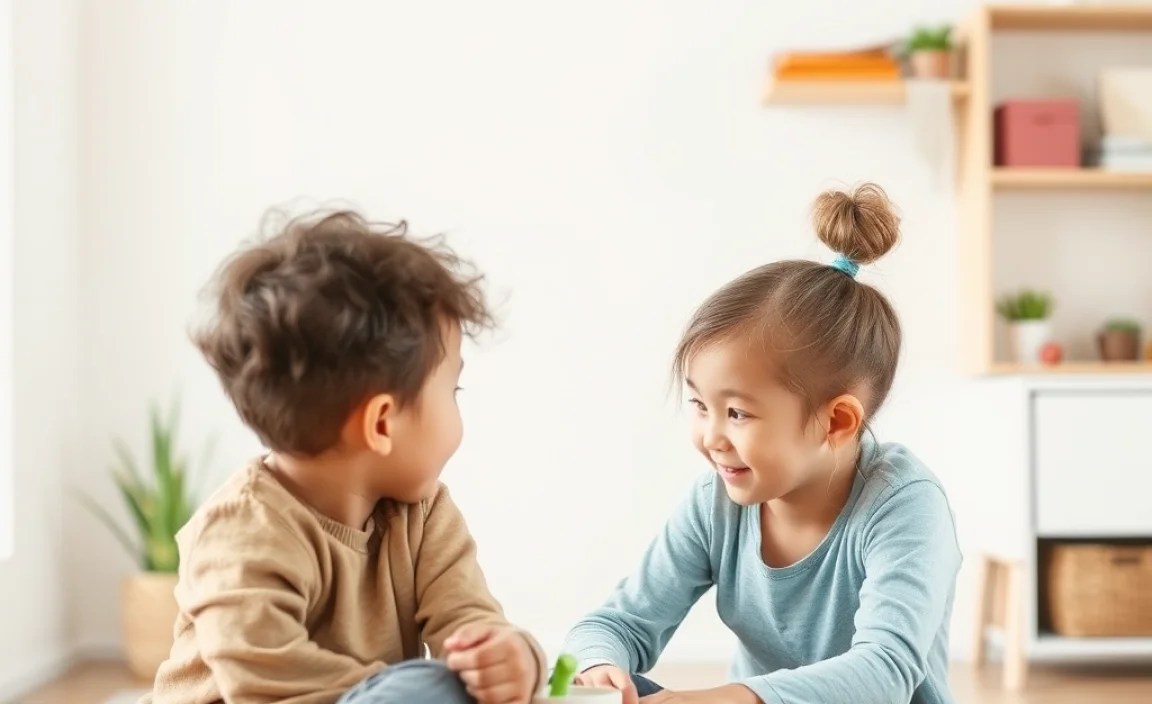Do you know a child who loves to talk and meet new friends? These children are often called extroverts. Parenting extroverted children can be both exciting and challenging. They love social activities and can be very energetic. Are you curious about how to best support them at home and in school? Let’s jump into the world of extroverted kids!
At A Glance
Key Takeaways
- Extroverted children thrive in social settings; they love meeting new people.
- Parenting extroverted children involves understanding their need for interaction.
- Provide opportunities for creative expression and social activities.
- Balance is crucial between active time and quiet time for extroverted kids.
- Encourage their interests to help them feel valued and understood.
Understanding Extroverted Children’s Needs

Extroverted children have a strong desire to be around people. They find energy in social interactions and often look forward to gatherings. These kids might talk a lot and enjoy being the center of attention. As a parent, it’s important to recognize and support these traits. Give them chances to socialize, like playdates or group activities. When you understand their needs, they feel appreciated and supported.
- Extroverts enjoy group activities.
- They often take the lead in conversations.
- They learn well through interaction.
- They may struggle with too much quiet time.
- They might get bored quickly when alone.
To help your extroverted child, focus on providing social opportunities. This could include clubs, sports, or family gatherings. Encourage them to express themselves through art, music, or theater. Balance is important, too. Make sure they have some downtime to relax and recharge. Understand that they express themselves through action and words. Support their ideas and listen actively to their stories.
Fun Fact or Stats : Extroverted children tend to have larger friend circles.
Finding the Right Activities
What activities make extroverted children happy? Think of those where they can interact and lead. Team sports, drama clubs, and group projects are excellent choices. These activities allow them to express themselves and build social skills. They feel happiest when engaged and included. Encourage them to try different activities to find what they love. This exploration helps them discover new interests and talents.
Managing Social Energy
Ever wonder why extroverted kids seem to have endless energy? They gain energy from being with others. However, even extroverts need breaks. It’s crucial to help them understand when it’s time to rest. Suggest quiet activities like reading or drawing. This balance prevents burnout and teaches them to appreciate alone time. An extroverted child with balanced energy is more likely to succeed and be happy.
Building Communication Skills
Do you know how important good communication skills are? Extroverted children naturally enjoy talking, but they need guidance to listen too. Teach them the value of listening in conversations. This helps them understand others’ feelings and perspectives. Encourage them to ask questions and be curious about different opinions. This way, their communication becomes richer and more meaningful.
Creating a Supportive Environment

Creating a home that supports an extroverted child involves space for expression and interaction. Create areas where your child can freely play and talk. Family games or storytelling sessions can be great. Encourage them to share their ideas and dreams. This environment fosters confidence and creativity. Remember, your support helps them grow into their true selves.
- Encourage open communication at home.
- Provide space for creative projects.
- Offer opportunities for social gatherings.
- Listen to their stories and ideas.
- Celebrate their achievements and milestones.
When you offer a supportive home, extroverted children feel secure. They know they can rely on their family for encouragement. This assurance boosts their self-esteem and helps them take on new challenges. A loving and communicative environment is key to their happiness and success.
Fun Fact or Stats : Extroverted kids often excel in teamwork and leadership roles.
Designing Personal Spaces
Have you ever thought about how a child’s room affects their mood? For extroverted kids, a personalized space can be energizing. Include bright colors and comfortable areas for them to relax. Let them choose decorations that reflect their interests. This personal space serves as a restful retreat when they need a break from socializing.
Fostering Family Communication
Why is family communication so important? It helps extroverted children feel connected and involved. Plan regular family meetings or dinner conversations. Encourage everyone to share their thoughts. This habit strengthens family bonds and teaches valuable communication skills. It also gives your child a safe space to express their feelings and ideas.
Encouraging Collaborative Activities
How do collaborative activities benefit extroverted kids? They enhance teamwork skills and provide social interaction. Group puzzles, science projects, or cooking together can be fun and educational. These activities teach children to respect others’ ideas and work together towards common goals. They learn the joy of cooperation and achieve satisfaction from shared successes.
Balancing Social and Alone Time

Extroverted children enjoy being around others, but they also need some alone time. Balancing these moments is important for their well-being. Encourage them to take breaks and enjoy quiet activities. Suggest reading a book or drawing when they need a pause. This way, they learn to appreciate solitude and recharge. A well-balanced child is healthier and happier.
- Help them find quiet hobbies.
- Teach them the value of solitude.
- Set regular rest times.
- Encourage creative activities alone.
- Model good relaxation habits.
When extroverted children learn to balance their social and alone time, they gain self-awareness. They understand their needs better and feel in control. This balance is crucial for their mental and emotional health. It also prepares them for the future, teaching them to manage their time wisely and independently.
Fun Fact or Stats : Regular quiet time boosts creativity and problem-solving skills.
Introducing Quiet Time Activities
What quiet activities can engage an extroverted child? Consider puzzles, reading, or gardening. These activities can soothe and calm their minds. Encourage them to find joy in these quieter moments. They might discover new interests or talents. It’s important for kids to learn how to entertain themselves without always relying on others.
Setting Relaxation Routines
How do relaxation routines benefit extroverted children? They provide structure and predictability. Create a bedtime routine with calming activities like reading or listening to music. This helps children wind down and prepares them for restful sleep. A good night’s sleep is crucial for their daily energy levels and overall mood.
Teaching Mindfulness and Relaxation
Have you ever tried mindfulness exercises with your child? They can be very beneficial. Teach them simple breathing exercises or guided imagery. These practices help children manage stress and stay calm. They also learn to focus better, which is useful in both school and play. Mindfulness is a skill they can use throughout their lives.
Encouraging Creativity and Expression

Extroverted children often have vivid imaginations and love to express themselves. Support this creativity by providing materials and opportunities. Art supplies, musical instruments, or a video camera can be great choices. Let them explore and create freely. Encourage them to share their creations with family and friends. Praise their efforts and celebrate their unique talents.
- Provide art and craft supplies.
- Encourage music or dance practice.
- Support their storytelling adventures.
- Organize talent shows at home.
- Praise their creative efforts.
Nurturing creativity boosts children’s confidence. It allows them to express their thoughts and emotions in healthy ways. Encourage trial and error, reminding them that mistakes are part of learning. This approach fosters resilience and innovative thinking. Celebrate their progress and creations, no matter how small. Your support inspires them to dream big.
Fun Fact or Stats : Creative activities improve cognitive development and emotional intelligence.
Exploring Art and Craft Projects
Do your children love art and crafts? Many extroverted kids do! Provide them with a variety of materials, such as paints, clay, and recycled items. Encourage them to use their imagination and create whatever comes to mind. You might be surprised by their creativity. Art projects can also be a great way to spend time together as a family.
Incorporating Music and Dance
How does music and dance benefit extroverted children? These activities allow them to express emotions and energy. Encourage your child to sing, play an instrument, or dance. They can join a local choir or dance class. Music and dance enhance coordination, rhythm, and social interaction. Plus, they’re a lot of fun! Let them explore different styles to find what they enjoy most.
Organizing Family Talent Shows
Why not organize a family talent show? It’s a great way for extroverted children to shine. Invite family members to perform a song, dance, or skit. This event encourages creativity and teamwork. Children learn to appreciate others’ talents and share their own. It’s a fun, bonding experience for everyone involved. Plus, it boosts children’s confidence in a supportive environment.
Conclusion
Parenting extroverted children is a rewarding journey. By understanding their needs, you help them thrive. Provide social opportunities and encourage creativity. Balance their social time with relaxing activities. Your support helps them grow into confident and happy individuals. Enjoy the exciting adventure of raising an extroverted child!
FAQs
Question: How can I help my extroverted child make friends?
Answer: Encourage your child to join group activities like sports or clubs. These settings provide opportunities to meet new friends. Teach them social skills such as sharing and listening. Praise their efforts in making connections. Your support helps them build lasting friendships.
Question: What should I do if my extroverted child feels lonely?
Answer: Encourage your child to engage in activities they enjoy. Arrange playdates or group outings to help them connect with others. Listen to their feelings and reassure them. Remind them of their strengths and that it’s normal to feel lonely sometimes. Your support makes a difference.
Question: How can I balance social time and rest for my child?
Answer: Set regular routines that include both social and rest times. Encourage quiet activities during downtime. Teach them the importance of rest for energy and well-being. Model this balance in your own life. This helps them understand and appreciate both social and solo activities.
Question: How do I encourage creativity in my extroverted child?
Answer: Provide them with various creative materials like art supplies and musical instruments. Encourage them to explore and express themselves freely. Praise their efforts and celebrate their creations. Support their interests in music, dance, or drama. This boosts their confidence and nurtures their creativity.
Question: What activities suit extroverted children best?
Answer: Extroverted children thrive in group settings. Consider team sports, drama clubs, or group projects. These activities enhance their social skills and provide opportunities for leadership. Encourage them to try different activities to find what they love. This exploration helps them discover new talents.
Question: How do I support my child in school?
Answer: Communicate with teachers about your child’s social needs. Encourage participation in group work and school clubs. Praise their efforts and achievements. Help them balance study time with social activities. Your involvement supports their learning and personal growth.
